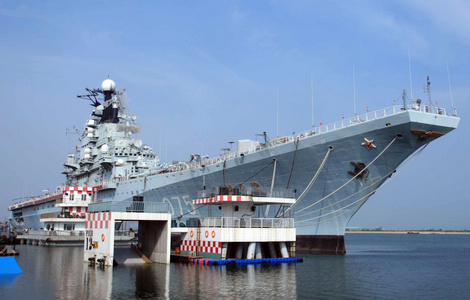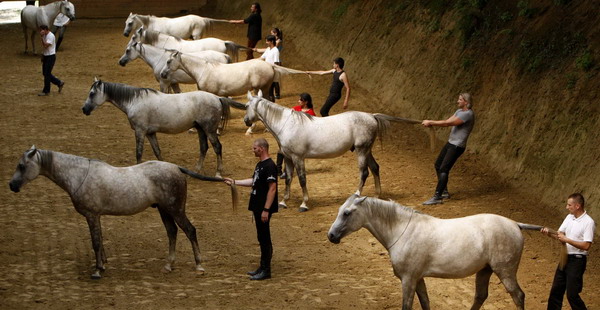As euro teeters, EU leaders take vacations
Updated: 2011-08-09 21:01
(Agencies)
|
|||||||||||
BRUSSELS?- As the European economy teeters on the precipice, French President Nicolas Sarkozy is by the Mediterranean in his swimming trunks. His prime minister is vacationing in Tuscany.
British Chancellor George Osborne is in California, where he rode the Jurassic Park log flume at Universal Studios in Los Angeles. The entire 15-member cabinet of debt-ridden Ireland has left Dublin, though the finance minister is taking calls from his home in Limerick, and the European Union is pretty much shut.
Europeans have always treasured their long summer vacations, and that goes for their leaders as well. But some analysts say this has left the continent rudderless just when firm action is needed.
"Of course, it sends a terrible signal to the markets when the governments of Europe decamp on their holidays in the middle of a crisis," said David Marsh, the author of a book titled, "The Euro: The Battle for the New Global Currency." "It does considerable reputational damage when the situation actually demands decisiveness."
Those government spokesmen who can be reached say none of this makes any difference. Never mind that questions have arisen about the sustainability of debt loads in Italy and Spain _ economies much bigger and harder to rescue than those of the euro-using countries that have already been bailed out: Greece, Ireland and Portugal.
What with mobile phones and laptops, European leaders can conduct business from anywhere, including, presumably, poolside. The mantra of the month for European spokespeople is "constant contact," as in my boss is in constant contact with other European leaders, even though photos have appeared of him riding a bike or climbing a mountain.
For example, an official in the office of Austrian Chancellor Werner Feyman _ speaking on condition of anonymity in exchange for divulging sensitive information _ acknowledged that his boss was on holiday "somewhere in Europe," though, of course, "constantly on the phone."
Asked whether Jose Manuel Barroso, president of the European Commission, the EU's executive arm, was on vacation, spokeswoman Karolina Kottova scrupulously avoided using the V-word in her reply: "The president attends his duties and he is in regular contact with various leaders," she said. "He is constantly available and is basically working, not in Brussels ... "
The issue has gained enough traction among the public _ not all of whom can afford trips to Disneyland or the French Riviera _ that Britain's deputy prime minister, Nick Clegg, felt moved to mount a stern defense of government by dispersion.
"I reject completely this notion that somehow this government hasn't been functioning very effectively indeed last week and this week ... ," Clegg said Monday. "We are in constant contact with each other and we are working effectively together as a team this week as we do every week of the year."
British Prime Minister David Cameron had been on vacation in Tuscany, but he hurried back to London on Monday evening _though in response to Britain's rioting rather than to deal with economic disarray.
And if face-to-face meetings don't add any value, why have them at all? Normally, the European Union has a bad case of summit-itis, with the 27 national leaders gathering with withering regularity whenever it's not summer, at some cost to the climate. Finance and other ministers meet together often, as well.
Not everyone buys the argument that vacations make no difference in a time of economic peril. In the last few days, markets around the world have been rocked and many experts say the global economy risks falling into a second recession. Traders are something worse than jittery and, the argument goes, having national governments run on skeleton staffing is doing nothing to calm their nerves.
"Well, if you look at the European situation, there is definitely a lack of leadership, there is a lack of coordination, and this adds to the uncertainty of the markets," said Oscar Bernal, an economist with ING bank.
The U.S. energy consulting firm Cameron Hanover put it more bluntly: "August has been a sacrosanct month in Europe for generations, and government leaders always take time in August for themselves," the firm said in a report Monday. "This year, that stubborn insistence is hurting the global economy."
Not all leaders have succumbed to temptation. Prime Minister Jose Luis Rodriguez Zapatero interrupted his vacation to spend most of last week in Madrid. Spanish Finance Minister Elena Salgado canceled her vacation to deal with the crisis.
Italian lawmakers have cut short their vacation _ though that only means returning September 6 instead of September 12. And the country's new justice minister Nitto Francesco Palma (who's just been on the job since July 27) took the unusual step of issuing a press release to say he was in his office.
But others contend they have good reason to continue their vacations. French news reports quote an aide as saying that Sarkozy is not returning to Paris because he doesn't want to panic the public.
And some offer no explanation at all. On Sunday, the Belgian finance minister, Didier Reynders, posted a picture on his Facebook page of himself on top of a mountain.
His two-word caption said it all. "En vacances," it read. On vacation.
Hot Topics
The European Central Bank (ECB) held a conference call late on Sunday ahead of the market opening, pledging the ECB will step in to buy eurozone bonds with efforts to forestall the euro zone's debt crisis from spreading.
Editor's Picks

|

|

|

|

|

|







